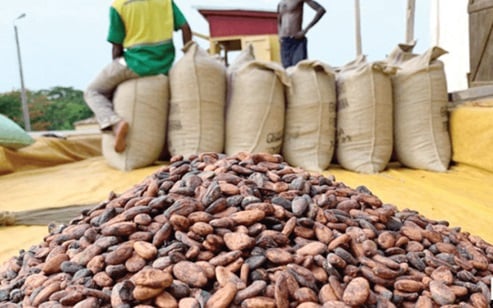The Ghana Cocoa Board (COCOBOD) has decided to maintain the current producer price for cocoa for the 2025/26 season, despite a recent price hike by neighboring Côte d’Ivoire. This announcement, communicated in an official letter to the Licensed Cocoa Buyers’ Association of Ghana (LICOBAG), comes as a surprise to many industry observers who anticipated Ghana would follow Côte d’Ivoire’s lead in raising prices to cushion farmers against escalating input costs and volatile global market conditions. COCOBOD’s decision, however, signals a more cautious and calculated approach, prioritizing the long-term financial stability and operational sustainability of the Ghanaian cocoa industry.
COCOBOD’s decision, explained in the letter signed by Dr. James Kofi Kutsoati, Acting Deputy Chief Executive for Operations, emphasizes a thorough evaluation of the potential financial and operational ramifications of a price increase on the local cocoa industry. While acknowledging the prevailing economic pressures faced by cocoa farmers, the board underscored its commitment to a comprehensive review of the producer price, fees, and margins for all stakeholders during the 2025/26 season. This suggests that a price adjustment is not entirely off the table, but rather postponed pending further analysis and consultations.
The contrasting decisions by Ghana and Côte d’Ivoire highlight the different strategies employed by the two leading cocoa-producing nations in addressing the challenges faced by their respective cocoa sectors. While Côte d’Ivoire opted for an immediate price increase to directly alleviate the financial burden on farmers, Ghana has chosen a more measured approach, focusing on the long-term health and sustainability of its cocoa industry. This divergence in strategies reflects the unique economic and political contexts of the two countries, as well as their individual priorities regarding cocoa production.
The announcement has elicited mixed reactions from stakeholders within Ghana’s cocoa sector. Some farmers have expressed disappointment over the absence of an immediate price increase, particularly given the rising cost of production. They argue that maintaining the current price fails to adequately address their immediate financial needs and could potentially discourage cocoa farming, particularly among younger generations. Others, however, view COCOBOD’s commitment to a future review as a positive sign, indicating a willingness to engage with stakeholders and potentially adjust prices if deemed financially and operationally viable. This group believes a cautious approach is prudent, ensuring the long-term viability of the cocoa industry.
COCOBOD’s decision underscores the complex balancing act faced by cocoa-producing nations. They must support the livelihoods of their farmers while ensuring the long-term financial stability and competitiveness of their cocoa industries in a volatile global market. The rising input costs, including fertilizers and pesticides, coupled with fluctuating global cocoa prices, create a precarious situation for farmers, often leaving them with slim profit margins. A significant price increase, while providing immediate relief to farmers, could also impact the financial viability of the cocoa boards and potentially reduce the competitiveness of the national cocoa industry on the international market.
The upcoming review promised by COCOBOD will be crucial in determining the future direction of Ghana’s cocoa sector. The board’s consultations with stakeholders, including farmers, buyers, and processors, will be essential in gathering diverse perspectives and arriving at a decision that balances the needs of all parties involved. The outcome of this review will not only affect the livelihoods of thousands of cocoa farmers but also shape the future of Ghana’s cocoa industry and its contribution to the national economy. COCOBOD’s commitment to revisiting the issue suggests a willingness to adapt its strategy based on evolving market conditions and the needs of its stakeholders.














